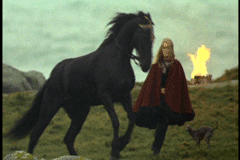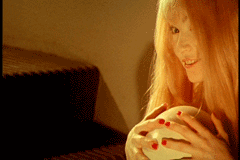|
Newest Reviews:
New Movies -
The Tunnel
V/H/S
The Tall Man
Mama Africa
Detention
Brake
Ted
Tomboy
Brownian Movement
Last Ride
[Rec]≥: Genesis
Hara-Kiri: Death of a Samurai
Indie Game: The Movie
Abraham Lincoln: Vampire Hunter
Old Movies -
Touki Bouki: The Journey of the Hyena
Drums Along the Mohawk
The Chase
The Heiress
Show
People
The Strange Affair of Uncle Harry
Pitfall
Driftwood
Miracle Mile
The Great Flamarion
Dark Habits
Archives -
Recap: 2000,
2001, 2002,
2003, 2004
, 2005, 2006,
2007 , 2008
, 2009 ,
2010 , 2011 ,
2012
All reviews alphabetically
All reviews by star rating
All reviews by release year
Masterpieces
Screening Log
Links
FAQ
E-mail me
HOME
| |
Spirits
of the Dead (Roger Vadim, Louis Malle, Federico Fellini) 1967
 Spirits
of the Dead, a
handsomely mounted 1967 film that features three segments from three European
giants (Vadim, Malle, and Fellini) all based on Edgar Allen Poe short stories.
The third segment, Felliniís Toby Dammit, is so incredibly different and dense
when compared to the other two that you almost forget youíve watched an
anthology by the time the film ends. His work here is as good as heís ever
been visually, and the world that he creates perfectly represents the inner
turmoil of the self-destructive actor Toby Dammit (Terrance Stamp). The director
presents his typical circus or parade; whichever you want to call it, and this
time it shows the world of the celebrity in modern day Rome. Itís obviously
been liberally adapted from the original Poe story, and itís only nominally a
horror tale (Toby is stalked by a BjŲrk-ish devil figure), but the film
transcends any generic or authorial labels: itís purely Felliniís, and at a
little over forty minutes long it doesnít burn out the audience in the way
that his longer pageants tend to. Spirits
of the Dead, a
handsomely mounted 1967 film that features three segments from three European
giants (Vadim, Malle, and Fellini) all based on Edgar Allen Poe short stories.
The third segment, Felliniís Toby Dammit, is so incredibly different and dense
when compared to the other two that you almost forget youíve watched an
anthology by the time the film ends. His work here is as good as heís ever
been visually, and the world that he creates perfectly represents the inner
turmoil of the self-destructive actor Toby Dammit (Terrance Stamp). The director
presents his typical circus or parade; whichever you want to call it, and this
time it shows the world of the celebrity in modern day Rome. Itís obviously
been liberally adapted from the original Poe story, and itís only nominally a
horror tale (Toby is stalked by a BjŲrk-ish devil figure), but the film
transcends any generic or authorial labels: itís purely Felliniís, and at a
little over forty minutes long it doesnít burn out the audience in the way
that his longer pageants tend to.
 The
other two segments are certainly solid, even if they might not top Felliniís
work with sheer panache. Vadimís piece is the better of the remainder, and it
features Jane and Peter Fonda as feuding cousins. This is the most overtly
supernatural segment of the trio, and even it feels somewhat subdued when
compared to modern ghost stories. Jane Fonda is excellent in her role, and she
brings a combination of refinement and haughtiness to the part that vitalizes
the character. Like all of the film, this bit of the film is well shot, but
Vadimís captured some gorgeous outdoor scenery, whereas the others take place
mostly indoors. The tale itself is spooky enough, and the running time feels
sufficient. The only real negative mark here is that the film resorts to a
slightly jarring voiceover narration here to fill in background details.
Malleís segment is likable enough, but it feels somewhat slighter than the
other two. Its gambling scene evokes Kubrickís Barry
Lyndon (just as the driving sequences in the Fellini segment recall A
Clockwork Orange), even if Spirits
was made several years earlier, and there is genuine tension aroused at the card
table. Throughout the film, there is a relatively low gore quotient, and the
acting is uniformly solid. As far
as psychological horror goes, the films work well, and that they realize Poeís
stories were mainly internalized distortions of the world works to their
advantage, even as they approach the material in vastly different ways.
The
other two segments are certainly solid, even if they might not top Felliniís
work with sheer panache. Vadimís piece is the better of the remainder, and it
features Jane and Peter Fonda as feuding cousins. This is the most overtly
supernatural segment of the trio, and even it feels somewhat subdued when
compared to modern ghost stories. Jane Fonda is excellent in her role, and she
brings a combination of refinement and haughtiness to the part that vitalizes
the character. Like all of the film, this bit of the film is well shot, but
Vadimís captured some gorgeous outdoor scenery, whereas the others take place
mostly indoors. The tale itself is spooky enough, and the running time feels
sufficient. The only real negative mark here is that the film resorts to a
slightly jarring voiceover narration here to fill in background details.
Malleís segment is likable enough, but it feels somewhat slighter than the
other two. Its gambling scene evokes Kubrickís Barry
Lyndon (just as the driving sequences in the Fellini segment recall A
Clockwork Orange), even if Spirits
was made several years earlier, and there is genuine tension aroused at the card
table. Throughout the film, there is a relatively low gore quotient, and the
acting is uniformly solid. As far
as psychological horror goes, the films work well, and that they realize Poeís
stories were mainly internalized distortions of the world works to their
advantage, even as they approach the material in vastly different ways.
***1/2
12-04-01
Jeremy
Heilman
|